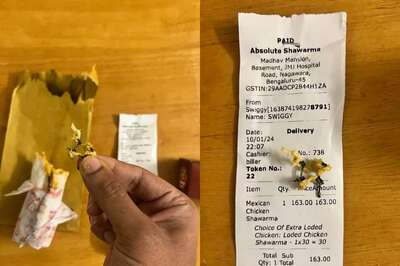
views
X
Trustworthy Source
PubMed Central
Journal archive from the U.S. National Institutes of Health
Go to source
These studies are only suggestive and more research is needed to confirm them, but you can try increasing your own magnesium intake and see if it works for you. Remember, however, that this isn’t a replacement for conventional treatments. You should only do this under your doctor or therapist’s supervision to ensure that you’re getting the best treatment possible.
Sources of Magnesium

Get between 300 and 500 mg of magnesium from your diet. In general, women should ingest around 320 mg daily and men should get about 460 mg. Design your diet to include magnesium-rich sources so you’re getting enough. Magnesium is safe and very difficult to overdose on, so you don’t need to worry about limiting your diet. Normally-functioning kidneys should filter out any excess magnesium. This total only refers to food, not magnesium from supplements that your doctor prescribes.

Eat leafy green vegetables and legumes every day. These are some of the richest magnesium sources. Include spinach, edamame, peanuts, and black or kidney beans in your meals for a good magnesium boost.

Replace white and enriched products with whole grain types. Whole grain and whole wheat products contain a lot more magnesium than white varieties. Have whole wheat bread, pasta, and rice instead of white flour types.

Have more low-fat dairy products. Milk, yogurt, and eggs are all good natural sources of magnesium. Try to have plain yogurt, or mix in fruit yourself. Flavored yogurt can be very high in sugar.

Snack on seeds and nuts for an extra boost. Almonds, cashews, and pumpkin seeds are all especially high in magnesium. They make a great snack during the day, or you can mix them into your meals. Just an ounce of pumpkin seed kernels has 168 mg of magnesium, making it the highest natural magnesium source.

Include more fortified products in your diet. Some cereals, breads, and oatmeals are fortified with extra minerals like magnesium. If you have a deficiency, then adding these products to your diet can give you a boost.

Take a magnesium dietary supplement with your doctor’s approval. On top of your regular diet, a daily magnesium supplement might help your depression. Make sure you ask your doctor before taking any supplements to make sure they’re right for you, then follow all of the dosing instructions so you don’t take too much. In general, magnesium supplements provide 300–500 mg per dosage. To treat depression, doctors usually use a higher dose. A common side effect of taking a lot of magnesium is diarrhea. This should pass when your body gets used to the higher dosage.
Maximizing Magnesium Absorption

Eat prebiotic foods to increase absorption. Prebiotics, which provide food for healthy bacteria in your gut, support magnesium absorption. Good prebiotic sources are oats, asparagus, leeks, garlic, bananas, onions, apples, and flaxseed. You could also take prebiotic supplements, but doctors recommend that you get as much as possible from your regular diet first.

Get 25-30 grams of fiber each day. While fiber is an important nutrient, getting too much could inhibit magnesium absorption. Keep your daily intake at the recommended 25-30 grams so you can absorb all the magnesium you ingest. If you aren’t sure how much fiber certain foods contain, you could look online or use a health app to measure it.

Drink alcohol in moderation. Heavy drinking can prevent your body from properly absorbing many nutrients, including magnesium. Keep your drinking limited to an average of 1-2 drinks daily. If you have problems reducing your drinking, then you should speak with a professional addiction counselor for some assistance.

Limit your caffeine intake if you have a magnesium deficiency. There is some evidence that excessive caffeine intake could reduce your body’s ability to absorb magnesium. Limit yourself to 2-4 caffeinated drinks per day if you have a magnesium deficiency.

Reduce your stress so your body absorbs nutrients correctly. Stress might also prevent your body from absorbing nutrients properly. Do your best to manage your stress levels to improve your absorption of nutrients. Try relaxation exercises like meditation, deep breathing, and yoga to control your stress. Reducing stress will also be beneficial for your depression.




















Comments
0 comment